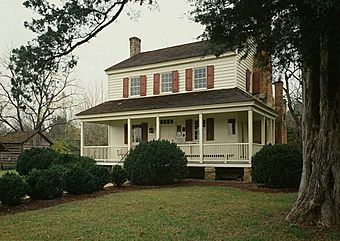Walnut Grove Plantation facts for kids
Quick facts for kids |
|
|
Walnut Grove Plantation
|
|

Walnut Grove Plantation
|
|
| Nearest city | Spartanburg, South Carolina |
|---|---|
| Built | 1765 |
| Architectural style | Georgian |
| NRHP reference No. | 70000603 |
| Added to NRHP | July 01, 1970 |
Walnut Grove Plantation is a historic home located in Roebuck, South Carolina, near Spartanburg, South Carolina. It was built in 1765 and was once a large farm. The plantation offers a glimpse into life in the Southern United States during the 1700s.
Contents
Walnut Grove Plantation: A Historic Home
Walnut Grove Plantation was originally the home of Charles and Mary Moore. They built the house in 1765. The land for their farm was given to them by King George III. Charles Moore was a school teacher. He used the 3,000-acre (12 km2) property as a working farm. The Moores had ten children. Many of their family members still live in the area today.
A Heroine of the Revolution
One of the Moore's children was their eldest daughter, Margaret Catharine Moore. She is better known as Kate Barry. Kate played an important role during the American Revolutionary War. She served as a scout for General Daniel Morgan. This was before a major battle called the Battle of Cowpens. Kate Moore Barry is also remembered for planting the beautiful grove of black walnut trees on the property.
Exploring the Plantation Today
Today, the main house at Walnut Grove Plantation has been carefully restored. It looks much like it did long ago. Visitors can take tours through the main house. They can also explore other buildings on the property. These include a schoolhouse, a wheat house, and other historic structures. It's a great way to learn about history.
The Mystery of the Stain
For many years, there was a famous story about a stain on the floor. It was in an upstairs bedroom of the main house. People believed it was the blood of a Patriot named John Steadman. The story said he was killed by Loyalist forces. These forces were led by a man named Bill Cunningham. This story was very popular with tourists. However, in the 21st century, scientists studied the stain. They found out it was not human blood. Because of this, tour guides no longer tell the story that it was from the murder. It remains a mystery, but it is just a stain.
 | Selma Burke |
 | Pauline Powell Burns |
 | Frederick J. Brown |
 | Robert Blackburn |



